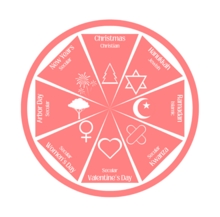Portal:Holidays
| Main page | Calendar | Categories |
Introduction

A holiday is a day or other period of time set aside for festivals or recreation. Public holidays are set by public authorities and vary by state or region. Religious holidays are set by religious organisations for their members and are often also observed as public holidays in religious majority countries. Some religious holidays, such as Christmas, have become secularised by part or all of those who observe them. In addition to secularisation, many holidays have become commercialised due to the growth of industry.
Holidays can be thematic, celebrating or commemorating particular groups, events, or ideas, or non-thematic, days of rest that do not have any particular meaning. In Commonwealth English, the term can refer to any period of rest from work, such as vacations or school holidays. In American English, the holidays typically refers to the period from Thanksgiving to New Year's, which contains many important holidays in American culture. (Full article...)
Selected article

St. George's Day is celebrated by several nations of whom Saint George is the patron saint, including Georgia, Bulgaria, Portugal, England, Catalonia and the Gora. For England, St. George's Day also marks its National Day. Most countries who observe St. George's Day celebrate it on 23 April, the traditionally accepted date of Saint George's death in 303. For those Eastern Orthodox Churches that follow the Julian calendar, 23 April is equal to 6 May, Gregorian calendar. The Country of Georgia celebrates it on 23 November.
His feast date remains the second most important National Feast in Catalonia. There, it is known in Catalan as Diada de Sant Jordi and it is traditional to give a rose and a book to a loved one. This tradition inspired UNESCO to declare this the International Day of the Book, since 23 April 1616 was also the date of the death of the English playwright William Shakespeare and the Spanish author Miguel de Cervantes.
Selected biography

Father Time is a personification of time. He is usually depicted as an elderly bearded man, dressed in a robe, carrying an hourglass or other timekeeping device. This image is culled from several sources, including the Holly King, the Celtic god of the dying year, and Chronos, the Greek god of time. Because of their similarity in name as pertaining to parental figures, he is sometimes paired with Mother Nature as a married couple. Sometimes, due to the relationship between death and aging, Father Time is associated with the Grim Reaper.
Things you can do
 |
Here are some tasks awaiting attention:
|
Selected image
Selected quote
| “ | True love is inexhaustible; the more you give, the more you have. | ” |
| — Antoine de Saint-Exupéry | ||
Related portals
WikiProjects
Major topics
Holidays - Anniversaries - Civic holidays - Federal holidays - Hallmark holidays - Heroes' Day - National holidays - Observances - Holidays by Country - Victory Days
Lists: Christmas carols - Christmas dishes - Hindu festivals - Holidays by country - Objects dropped on New Year's Eve - Winter festivals
Religious festivals: Buddhist festivals - Christian festivals - Islamic festivals - Neopagan holidays - Hindu festivals - Jain festivals - Jewish holidays - Roman festivals
Secular holidays: April Fools' - Armed Forces Day - Boss's Day - Children's Day - Cinco de Mayo - Commonwealth Day - Earth Day - Father's Day - Grandparents' Day - Halloween - HumanLight - Labor Day - May Day - Mother's Day - Naadam - Pi Day - Presidents' Day - Spring break - Teachers' Day - Thanksgiving - Yom Yerushalayim
Winter holidays: Chinese New Year - Christmas - Dōngzhì - Eid ul-Adha - Festivus - Groundhog Day - Hanukkah - Kwanzaa - New Year's Eve - Shab-e Chelle - Sol Invictus - Twelfth Night - Valentine's - Winter Solstice - Yule
Associated Wikimedia
The following Wikimedia Foundation sister projects provide more on this subject:
-
Commons
Free media repository -
Wikibooks
Free textbooks and manuals -
Wikidata
Free knowledge base -
Wikinews
Free-content news -
Wikiquote
Collection of quotations -
Wikisource
Free-content library -
Wikiversity
Free learning tools -
Wiktionary
Dictionary and thesaurus











